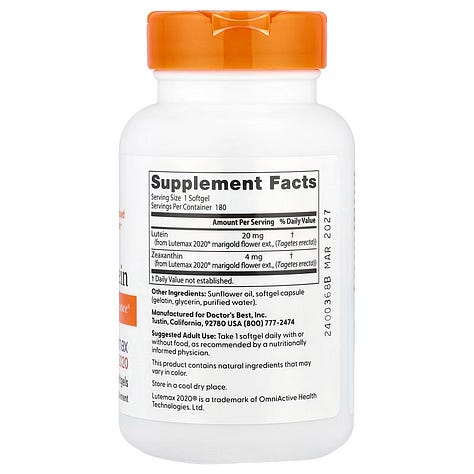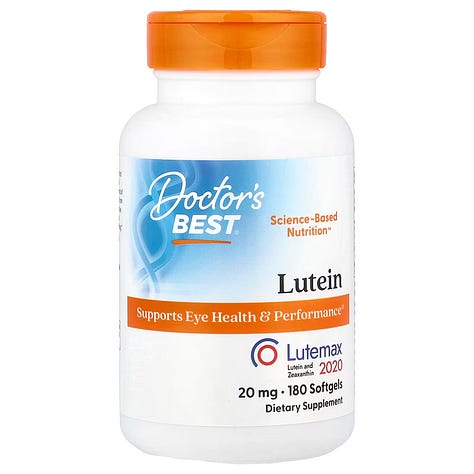TL;DR: Lutein and zeaxanthin, carotenoids often associated with eye health, are gaining attention for their potential roles in cognitive and metabolic longevity. These nutrients accumulate in brain regions tied to memory and executive function, suggesting neuroprotective effects. Emerging research links higher levels of these carotenoids to improved cognitive performance and reduced oxidative stress, although more studies are needed to confirm causality. In my approach, I rely on bioavailable sources like egg yolks, supplemented with 40 mg lutein and 8 mg zeaxanthin on feeding days (split across meals with healthy fats). Their fat-soluble nature means I skip supplementation on fasting days. While subjective, I’ve noticed benefits like reduced digital eye strain and steady cognitive energy. These nutrients may support systemic resilience by influencing neural health. Incorporating them through diet and/or supplements could form part of a broader longevity strategy. The science is evolving, but their potential warrants exploration.
Longevity research often gravitates toward high-profile interventions like genetic editing1 or cutting-edge pharmaceuticals2. Yet, some of the most effective strategies may lie in the everyday choices we make—such as optimizing our nutrient intake. Lutein and zeaxanthin, carotenoids celebrated for their role in eye health, are increasingly being studied for their potential contributions to cognitive and metabolic health. Here’s why these underappreciated nutrients might warrant closer attention.

Lutein and Zeaxanthin May Support Cognitive Health
These carotenoids accumulate in the retina, where they shield the eyes from oxidative stress and blue light exposure.3 Emerging evidence suggests they also concentrate in regions of the brain tied to memory and executive function, such as the hippocampus and frontal cortex,4 and their presence in these areas strongly suggests a potential role in supporting neurological health.
In one study, individuals with higher dietary intake of these carotenoids tended to perform better on cognitive tests.5 Other studies have found associations between higher levels of lutein and zeaxanthin and improved cognitive performance, including memory, processing speed, and attention6. Their suggested neuroprotective effects could come from their ability to mitigate oxidative stress and inflammation—factors implicated in conditions such as Alzheimer’s disease.
My Protocol
While these findings are promising, we don’t yet have enough research to establish causality and clarify the mechanisms at play. But, I am convinced enough that I’ve added these nutrients to my protocol.
While I eat a lot of free-range eggs, the yolks of which are a good source, I also supplement to ensure consistent intake on feeding days. I take 40 mg of lutein and 8 mg of zeaxanthin daily, divided into two doses: one with my morning meal and one around mid-day. Both meals include adequate healthy fats to enhance absorption. On fasting days, I don’t take any fat-soluble supplements, for obvious reasons.
Anecdotally, I’ve observed benefits such as reduced digital eye strain and what feels like steadier cognitive energy throughout the day. While these effects are subjective, they align with the emerging understanding of how these nutrients may support systemic health.
Integrating Lutein and Zeaxanthin into Your Routine
If you are considering incorporating these carotenoids into your dietary strategy, here are some evidence-informed approaches:
Consider Supplementation: For those with limited dietary sources, supplementation may provide a consistent intake. Seek products with clinically supported ratios of lutein and zeaxanthin. My current go-to is Doctor’s Best Lutemax 2020 from iHerb, but I’d love to hear from you if you have thoughts about a superior source.



Enhance Absorption with Fats: As fat-soluble compounds, these nutrients are absorbed more effectively when consumed with healthy dietary fats.
Systemic Effects
While lutein and zeaxanthin are well-established for their contributions to eye health, their potential in cognitive and metabolic resilience are areas of active investigation. Preliminary research hints at their potential in reducing oxidative stress and supporting neural tissue.
As our understanding of these interconnected systems evolves, lutein and zeaxanthin appear to represent foundational components of a balanced longevity strategy. However, ongoing research will better determine the full extent of their effects and how to refine practical applications.
Share Your Experience
Have you used lutein and zeaxanthin in your own protocol? What observations or questions do you have?
Wareham C. S. (2020). Genome editing for longer lives: The problem of loneliness. Journal of Bioethical Inquiry, 17(2), 309–314. https://doi.org/10.1007/s11673-020-09967-w
Wareham critiques the Objection from Loneliness, which suggests extending human lifespans through germline gene-editing imposes loneliness on future generations. Wareham argues that longer lifespans may not inherently increase loneliness due to evolving social norms and shared lifespan extensions among cohorts. Even if longer lives entail loneliness, Wareham contends such lives may still be valuable, as loneliness can reflect meaningful relationships and loss. Additionally, he argues the benefits of life extension, such as intergenerational connections and achieving significant goals, could outweigh potential loneliness–a conclusion that calls for balanced ethical considerations over absolute objections to gene-editing.
Can Geroprotectors Truly Slow Aging and Extend Lifespan? https://masi.eu/en-aud/blogs/anti-aging-science/can-geroprotectors-truly-slow-aging-and-extend-lifespan
Lima, V.C., Rosen, R.B. & Farah, M. Macular pigment in retinal health and disease. International Journal of Retina and Vitreous 2, 19 (2016). https://doi.org/10.1186/s40942-016-0044-9
Lindbergh, C. A., Mewborn, C. M., Hammond, B. R., Renzi-Hammond, L. M., Curran-Celentano, J. M., & Miller, L. S. (2017). Relationship of Lutein and Zeaxanthin Levels to Neurocognitive Functioning: An fMRI Study of Older Adults. Journal of the International Neuropsychological Society, 23(1), 11–22. doi:10.1017/S1355617716000850
Lindbergh et al. looked at the relationship between lutein and zeaxanthin levels and cognitive functioning in older adults using fMRI during verbal memory tasks, and found that higher concentrations, measured in the retina and serum, were associated with greater neural efficiency. Lower levels correlated with increased brain activation (indicative of compensatory effort) in regions related to memory and language. Their findings suggest that lutein and zeaxanthin may enhance cognitive performance by reducing neural inefficiency, suggesting a potential role in mitigating age-related cognitive decline.
Zuniga, K. E., Bishop, N. J., & Turner, A. S. (2021). Dietary lutein and zeaxanthin are associated with working memory in an older population. Public Health Nutrition, 24(7), 1708–1715. doi:10.1017/S1368980019005020
Feeney, J., O’Leary, N., Moran, R., O’Halloran, A. M., Nolan, J. M., Beatty, S., ... & Kenny, R. A. (2017). Plasma lutein and zeaxanthin are associated with better cognitive function across multiple domains in a large population-based sample of older adults: findings from the Irish longitudinal study on aging. Journals of Gerontology Series A: Biomedical Sciences and Medical Sciences, 72(10), 1431-1436.
Hammond Jr, B. R., Miller, L. S., Bello, M. O., Lindbergh, C. A., Mewborn, C., & Renzi-Hammond, L. M. (2017). Effects of lutein/zeaxanthin supplementation on the cognitive function of community dwelling older adults: a randomized, double-masked, placebo-controlled trial. Frontiers in aging neuroscience, 9, 254.


